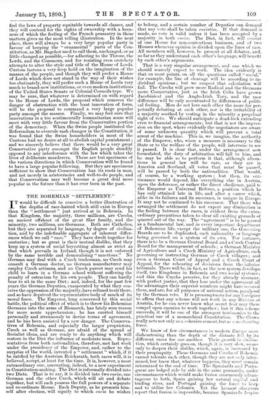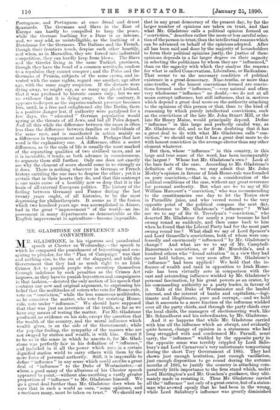THE BOHEMIAN "SETTLEMENT."
IT would be difficult to conceive a better illustration of the depths of race-hatred which still exist in Europe than the " settlement " just arrived at in Bohemia. In that Kingdom, the majority, three millions, are Czechs, an ancient offshoot of the great Slav family, and the minority, two millions, are Germans. Both are Catholics, but they are separated by language, by degree of civilisa- tion, and by the indefinable aggregate of inherent differ- ences which we call "race." They have dwelt together for centuries ; but so great is their mutual dislike, that they keep up a system of social boycotting almost as strict as that which prevails in Ireland, though it is not enforced by the same terrible and demoralising "sanctions." No German may deal with a Czech tradesman, no Czech may consult a German doctor, no German manufacturer may employ Czech artisans, and no Czech parent may send his child to learn in a German school without suffering the penalty of ostracism by his own people. They can hardly bear to sit in the same Diet ; and, indeed, for the past few years the German Deputies, exasperated by what they con- ceive the oppression of the majority, have refused to sit there, and so have deprived the representative body of much of its moral force. The Emperor, long concerned by this social battle, the political effect of which is to throw his Bohemian Germans into the arms of Bismarck, has lately seen reason for more acute apprehension ; he has exerted himself personally and strenuously to devise terms of agreement, and he has been assisted by a new danger. The Conserva- tives of Bohemia, and especially the larger proprietors, Czech as well as German, are afraid of the spread of Socialist ideas, and are ready to do anything which will restore in the Diet the influence of moderate men. Repre- sentatives from both nationalities, therefore, met last week under the presidency of the Emperor, and, rather to the surprise of the world, invented a " settlement " which, if it be ratified by the Austrian Reichsrath, both races will, it is believed, accept, at least for the time. It is, however, a most extraordinary one, amounting, indeed, to a new experiment in Constitution-mating. The Diet is informally divided into two Diets. That is to say, it is divided into two curie, one German and the other Czech, which will sit and debate together, but will each possess the full powers of a separate and co-ordinate House. Each Deputy, as he presents him- self after election, will signify to which curia he wishes to belong, and a certain number of Deputies can demand that any vote shall be taken curiatim. If that demand is made, no vote is valid unless it has been accepted by a majority in both curia. The Diet, in fact, will consist of one House for non-contentious business, and of two Houses whenever opinion is divided upon the lines of race. All members will, however, be present at all debates, and, so far as they understand each other's language, will benefit by each other's arguments.
That is a very singular arrangement, and one which we should scarcely expect to work. The idea evidently is that on most points, on all the questions called "social," for example, the line of cleavage will be according to in- dividual opinions ; but we suspect that calculation will fail. The Czechs will grow more Radical aud the Germans more Conservative, just as the Irish Celts have grown Jacobinical and the Anglo-Irish Tory, and the race difference will be only accentuated by differences of politi- cal feeling. Men do not love each other the more for per- petually debating at each other, nor is the irritability of a majority soothed by vesting in the minority a perpetual right of veto. We should anticipate a dead-lock extending even to financial arrangements ; but that is not the impres- sion on the spot, where evidently the negotiators are aware of some unknown quantity which will prevent a total arrest of the machine. This is, we imagine, the authority of the Emperor, who, when a measure is necessary to the State or to the welfare of the people, will intervene to see it passed. It is clear that, under the arrangement now formulated, the duty of arbitration will fall to him, and he may be able so to perform it that, although altera- tions in general law will be rare, as they are in America and Scotland, all votes that must be passed, will be passed by both the nationalities. That would, of course, be a working system ; but then, its con- tinuance would depend, like everything else in Austria, upon the deference, or rather the direct obedience, paid U., the Emperor as Universal Referee, a position which he has only attained late in life, and after a career which, alike in its failures and its successes, is unique in Europe. It may not be continued to his successor. That those who arranged the settlement do not expect any diminution in the feeling between the races, is evident from the extra- ordinary precautions taken to clear all existing grounds of quarrel out of the way. The "agreement" is to be passed as a fundamental law, and in every important department of Bohemian life, except the military one, the Governing. Boards are to be duplicated, each nationality or language being governed on a system of its own. For instance, there is to be a German Central Board and a Czech Central Board for the management of schools ; a German Ministry of Agriculture and a Czech Ministry of Agriculture, each governing or instructing German or Czech villages ; and even a German Court of Appeal and a Czech Court of Appeal, for the rehearing of decisions from the inferior tribunals. There will be, in fact, as the new system develops itself, two Kingdoms in Bohemia and two social systems ; and this the Czechs perceive, for they already murmur, with perfect justice, that they lose under the agreement all the advantages their superior numbers might have secured them, and are, for all purposes of national action, paralysed by the German veto. It is presumptuous for any foreigner to affirm that any scheme will not work in any division of Austria, for he can never know what secret fear may there compel open enemies to work together; but if this scheme succeeds, it will be one of the strongest testimonies to the practical use of a monarchical Constitution. The Crown really acts not only as a cohesive cement, but as a moderating force.
We know of few circumstances in modern Europe 1110n2 disheartening than the depth of the distaste felt by its different races for one another. Their growth in civilisa- tion, which certainly goes on, though it is very slow, seems only to deepen their dislike, which, again, is increased by their propinquity. These Germans and Czechs of Bohemia cannot tolerate each other, though they are not only inter- mixed, but know that, whatever happens, they must remain intermixed to the end of time. The Spaniards and Portu- guese are lodged side by side in the same peninsula, under circumstances which would make fusion enormously advan- tageous to both, Spain gaining her natural capital and trading river, and Portugal gaining the force to keep and to utilise her Colonies. Yet the keenest observers report that fusion is impossible, because Spaniards despise Portuguese, and Portuguese at once dread and detest Spaniards. The Germans and Slays in the East of Europe can hardly be compelled to keep the peace, while the German loathing for a Dane is as intense, and, we may add, as unintelligible, as the loathing of a Dutchman for the Germans. The Italians and the French, though their frontiers touch, despise each other heartily, and when, as in Marseilles, they are forced into industrial competition, they can hardly keep from blows. The Slays and the Greeks living in the same Turkish provinces, though they have the bond of a common servitude, confess to a repulsion they cannot conquer ; and the Poles and the Germans of Prussia, subjects of the same crown, and in- vested with the same rights, regard one another, age after age, with the same angry suspicion. If the distaste were dying away, we might say, as so many say about Ireland, that it was produced by historic causes only ; but we see no evidence that it is dying away. On the contrary, it appears to deepen as the superincumbent pressure becomes less, until, in a free and enlightened city like Berlin, there is a positive danger lest, if authority were paralysed for a few days, the " educated " German population would spring at the throats of all Jews, and bid. all Poles depart. And all this while the difference between the races is often less than the difference between families or individuals of the same race, and is manifested in action mainly as a difference in temperament and ideals. Perhaps that last word is the explanatory one. A difference, often a secret difference, as to the ends of life is usually the most marked of the separating qualities of two civilised races, and as it is incurable, it tends, as both advance in consciousness, to separate them still further. Only one does not exactly see why the element of scorn should come in so strongly as it does. There is nothing whatever in German or French history entitling the one race to despise the other ; yet it is certain that in their hearts they do, and that this contempt is one main cause of a hostility now so deep that it is the basis of all external European politics. The history of the feeling between Germany and France during the last twenty years ought, of all histories, to be the most depressing for philanthropists. It seems as if the fusion which two hundred years ago was accomplished in Alsace, had in the great " improvement " of the world—an im- provement in many departments as demonstrable as the English improvement in agriculture—become impossible.



















































 Previous page
Previous page